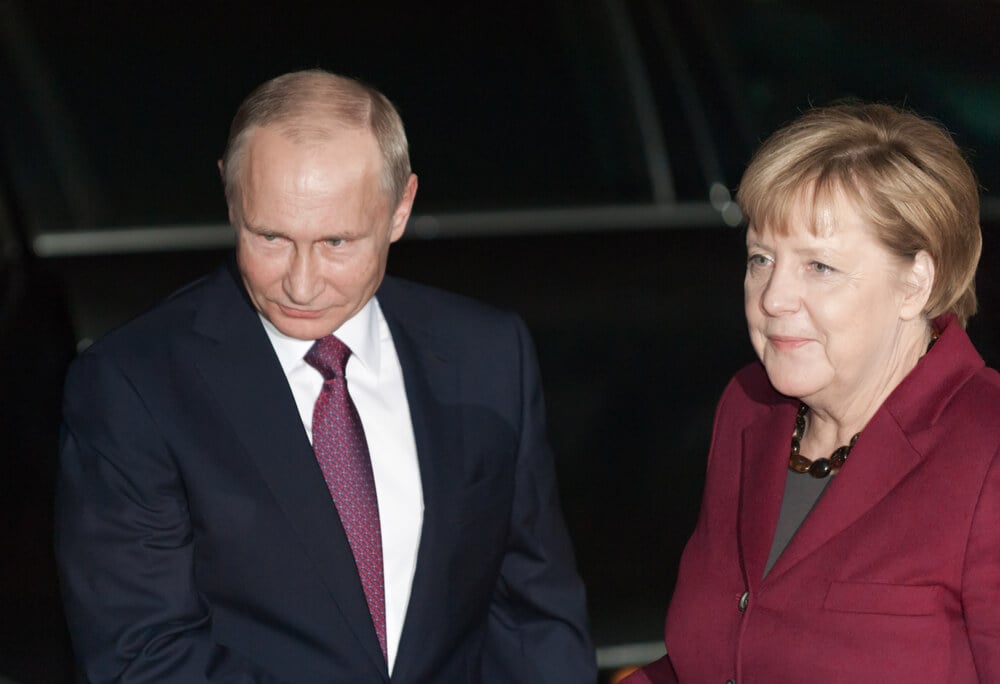"Russia. Kremlin. Putin. 25 Years" is the title of the 90-minute propaganda film that state television Rossiya 1 broadcast at the beginning of May to mark the quarter-century of Vladimir Putin's rule.
The authors, some of the most influential Kremlin propagandists, portrayed him as a likeable man next door who cares deeply about Russia. A humble servant of the people. A man of stability. A patriot who promises to restore greatness to a wounded nation.
Yet in the 25 years of his rule, Vladimir Putin has not only transformed Russia into a highly corrupt state with deep-rooted global networks and agents of influence in every Western capital. He has deliberately set out to reshape the world order.
Why didn't the international community recognise what was happening not just before our eyes but in plain sight, long before the full-scale invasion of Ukraine began?
After the Second Chechen War, when Grozny was reduced to rubble and tens of thousands of civilians were killed by carpet bombs?
After the assassination of Alexander Litvinenko with polonium on British soil — a nuclear attack in the heart of London?
After the invasion of Georgia in 2008 — the first redrawing of European borders by force since the Second World War?
After the annexation of Crimea, camouflaged by so-called "little green men"?
After the Russian state orchestrated doping scandals to corrupt the Olympic Games — and cheat the rules of the world in the process?
After the assassination of Boris Nemtsov just a few steps away from the walls of the Kremlin?
After the downing of flight MH17, in which 298 innocent civilians were killed by a Russian missile?
After the attempted murder of Sergei Skripal with Novichok in the UK?
After years of systematic assassinations, disinformation campaigns, cyber-attacks and election interference — from Berlin to Washington?
Clear and consistent pattern
Many of these tragic events were either ignored by Western governments, or they verbally expressed their "concern" and usually did not act decisively enough, giving Putin the feeling that he could go ahead.
Repression. Assassinations of opponents. Purges. Poisonings. Falsified elections. Military interventions. The carnage in Aleppo.
The West treated each event as an isolated incident, an unfortunate anomaly, rather than as part of a clear and consistent pattern.
The West did not even react decisively when former German Chancellor Gerhard Schröder accepted lucrative posts with Gazprom and Rosneft and acted as a lobbyist for the Kremlin's energy empire.
Should we mention that Mr Schröder is one of the main interlocutors in the propaganda film dedicated to the Putin anniversary?
Putin has established an axis of autocracies
Vladimir Putin has established an axis of autocracies, where regimes such as the junta in Burkina Faso, the military dictatorship in Myanmar, and the hermit kingdom of North Korea claim legitimacy and a seat at the table in a new global system that disregards democracy, the rule of law, and human rights as obsolete Western concepts.
He has not only exported gas and oil, but also corruption, disinformation, and political subversion. He has eroded Western institutions from within — undermining trust in elections, the media, and public discourse.
By funding both far-left and far-right forces, he has exacerbated divisions within democracies, exploiting every weakness in the system to weaken the resolve of the West.
Persistent search for justification
Almost every time he took steps to realise his imperial plan, Western leaders looked the other way — pretending that Putin's Russia would be a decent and normal country from that moment on.
Why did the West repeatedly opt for "reset" initiatives instead of confronting the threat — endlessly searching for justifications, clinging to illusions of partnership and de-escalation that never materialised?
 Europeans, and Germany in particular, were seduced by cheap Russian gas, easy money from Russian oligarchs, and the false promise of "stability"
Europeans, and Germany in particular, were seduced by cheap Russian gas, easy money from Russian oligarchs, and the false promise of "stability"
The West favoured convenience over confrontation, profit over principles, and short-term stability over long-term security.
Over the past 25 years, the West has underestimated Putin's ideological drive — his obsession with restoring Russia's imperial sphere of influence, his deep resentment of the West, and his fixation on erasing the humiliation of 1991, when the Soviet Union collapsed, which was Putin's obsession.
He was mistakenly thought to be a rational, transactional kleptocrat — when in reality he was a deeply ideological autocrat who fused KGB craft with imperial messianism.
Europeans, and Germany in particular, were seduced by cheap Russian gas, easy money from Russian oligarchs, and the false promise of "stability" when dealing with a predictable strongman.
A tragic summary of Putin's 25 years
Did the Western intelligence agencies warn their governments? Probably yes. Did the Eastern European allies warn the West? Absolutely. Should Russia's own history have served as a warning? Undoubtedly.
And yet the West chose to ignore the mounting evidence — out of fear, greed, and wishful thinking.
Is the West prepared for where Putin will send his "green men" next?
Now the consequences are here:
The biggest war in Europe since 1945. A shattered security architecture.
A strengthened axis of autocracies — from Moscow to Tehran and Pyongyang to Beijing.
A world in which authoritarian regimes are no longer hiding but are openly challenging the rules-based order.
This is the summary of Vladimir Putin's 25 years in the Kremlin.
The only question that arises now is: Is the West prepared for where Putin will send his "green men" next?